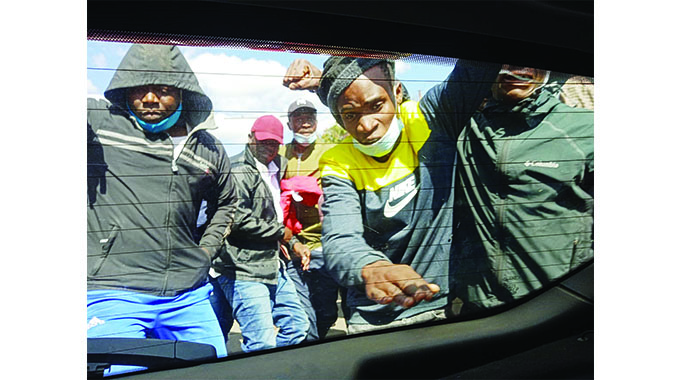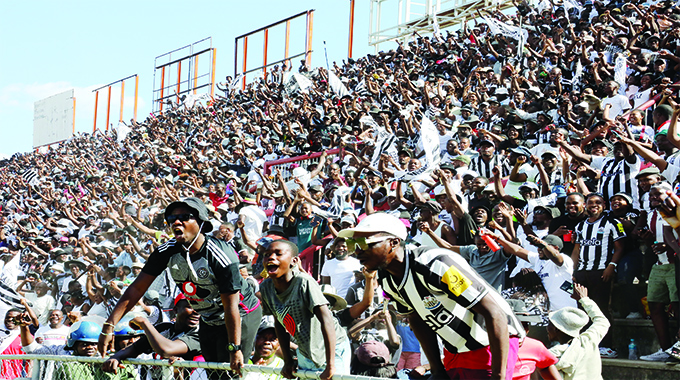Sportspersons should invest wisely while still active

Sikhumbuzo Moyo, Senior Sports Reporter
THIS week Senator Morgan Femai moved a motion on football in Zimbabwe after noting that most local footballers are struggling ‘while they are prominent people in the society’.
He said it was worrying that while footballers in other countries are living lavish lifestyles during and even after their playing careers, it was a different case with their Zimbabwean counterparts, who were literally beggars.
“During the 1960s and 1970s, the grounds used to be full to capacity with people who would want to watch players like George Shaya.
When the country attained independence, many people would rush to the stadium to watch George Shaya playing soccer.
“Sadly, a few months ago, I heard George Shaya had lost his leg through amputation and this has worsened his situation despite the fact that during the 1970s he was a very prominent soccer player; five times Soccer Star of the Year consecutively in Zimbabwe.
“In other countries, people that have been soccer stars on such numerous occasions own substantial businesses and have corporate sponsors.
“This is not happening in this country. It is only former chairpersons of such football clubs that you find driving motor vehicles, while players wallow in poverty,” said Femai, himself a former Dynamos chairperson.
It’s not only Shaya whose life has taken a turn for the worse in this country; there are many other footballers that illuminated our stadia during their playing days, but are now a pale shadow of their former selves.
It’s not only former footballers facing that predicament, but other retired sportspersons are in the same boat too, yet during their heydays, they earned more than most ordinary workers in the country.
So, what is so special about these retired sports personalities that they need special attention after their ‘working’ lives when similar attention is not being given to other retired workers?
Retired sportspersons were not offering their services for free, but they were paid and some paid handsomely for that matter.
Remember the Warriors’ players, who qualified for the country’s inaugural Africa Cup of Nations appearance?
The Government paid them much money and the clever ones invested wisely and are still enjoying the fruits of their investments, but others chose to be flashy.
Fast forward to the present, some of them are now living from hand to mouth due to their misplaced priorities.
We have heard of a former Warriors’ defender, now deceased, who was in the habit of hiring two cabs to take him home, one to carry him and the other to carry his jacket, after every windfall senior national team players received during the Dream Team era in the early 1990s.
If this is not recklessness, then nothing can ever be.
In fact, members of the Dream Team were handsomely rewarded and those that spent their earnings unwisely can’t complain that football has turned its back on them.
They were once at the top, but unfortunately lived for the day during their time in the sun.
While reasons for their plight might differ, one common denominator is that most sportspersons were rewarded for their sweat and toil at their peak.
It might not be, but they didn’t toil for nothing.
Zvenyika Makonese played for top South African side Orlando Pirates, earning top money, but he’s now a rank marshal in Masvingo probably because of bad financial decisions he made.
Former Dream Team and Dynamos captain Francis Shonhayi is another sad example of failing to invest.
Shonhayi went on to play for and captained both AmaZulu and Cape Town Spurs in the South African Premiership.
At some point, Shonhayi was the highest paid player in the South African PSL, but at the time of his death in 2006, he was working as a personal driver for his former boss at Cape Town Spurs David Rodwell.
Two-time Commonwealth boxing champion Alfonso Zvenyika is living in poverty in Mbare after blowing his handsome earnings.
Ndumiso Khanye was the top black tennis player of his generation and featured for the famous Zimbabwe Davis Cup team with the Black brothers Byron and Wayne, but he died a pauper.
The list is endless.
Simply put, sportspersons should invest wisely while still active, finish and klaar.
However, it is also fair to look at challenges that these sportspersons face, which probably explains why they find themselves in such predicaments.
Sportspersons in comparison to other professionals, tend to earn more before they reach the age of 30, and this calls for sound financial advice and other professional support.
Stonehage Fleming, a leading financial advisor to world’s richest families and wealth creators, says sports stars acquire wealth at an age when they have had little opportunity to develop the knowledge and skills to manage it or to handle the impact on their personal life and personal development, and because of their youth and inexperience, they are heavily dependent on agents and other professionals to look after their interests, both in the exploitation of their talents and in the management of their affairs.
“Because they are ‘in the public eye’ with a high media profile, they are obvious targets for those who wish to take advantage of them. As their sports careers come to an end, they have to prepare for a second career, which may be far less remunerative and less ‘glamorous’.
Most have to rely significantly on wealth amassed by their mid-30s to provide for their lifelong needs. If they fail to get it right, they may never get another opportunity,” says Fleming on its website stonehagefleming.com.
Needs, says Fleming, vary from sport to sport and from one individual to another, depending on their abilities, personalities and tastes.
Footballers are employees of their clubs, whereas golfers and tennis players are self-employed.
During the ‘golden years’, the aspiring sportsperson is dedicating himself almost entirely to success in his/her sport, almost to the exclusion of everything else.
He or she has a large support team to keep them at peak performance level, both physically and mentally and most need comparable support in looking after their longer-term life interests, both financially and otherwise.
The key difference between a sports star and most other successful individuals is that their earnings generally peak in their 20s and early 30s.
Fleming writes that sportspersons need at least three main advisers, who ideally will work to together as a team, an agent, a mentor and a wealth management and financial planner.
Agents will manage relationships with the key sources of revenue; the clubs in the case of footballers, the tour organisers in the case of golfers and tennis players, and the teams in the case of racing drivers. Most agents will also play a role in negotiating and managing sponsorship agreements and ‘image rights’ (the ability to exploit your name).
Agents are thus in a position of great trust with influence over very large sums of money on behalf of relatively vulnerable individuals.
Most sportspeople will have professional agents, often working for a large organisation, which has considerable experience in the relevant sport and all the necessary contacts to operate effectively.
Some, however, prefer to place their trust in family members or friends, because the relationship of total personal trust is more important than the experience, networks and support infrastructure of larger groups.
A mentor will often be an informal role, but nonetheless highly important and perhaps the most important of all.
Needs will vary, but it seems obvious that suddenly coming into large sums of money has a major impact on the lives of young people, which separates them from their peers.
A young sportsperson has to cope with wealth and fame with very little preparation and most will need a mentor to guide them through all the choices and pitfalls which now lie in front of them.
The mentor will add perspective and context to a situation, to keep the sportsperson grounded when the media build them up to disproportionate heights and to be there when they face adversity.
As well as his or her career, the sportsperson needs to cope with other life events, including relationships, marriage, births, deaths and sometimes divorce, all of which can be made more challenging because of the wealth or media attention.
Spouses too can be affected by the wealth and publicity.
The mentor or life coach will also play an important role in helping the sportsperson prepare for a second career, helping them assess their strengths and weaknesses and suitability for a variety of possible occupations.
“Long-term planning of finances is inextricably linked to decisions about career and lifestyle and too many sportspeople have suffered from advisers who take only a partial, short-term view. Most stars have only 10-15 years to convert temporary revenues into soundly based wealth, which will help provide for themselves and their families for the rest of their lives and beyond.
“At the most basic level this obviously requires some financial disciplines to avoid the temptations of excessive expenditure and to ensure enough is put aside to invest for the long-term.
“Whilst this is obvious, it is not always easy, depending on the reaction of the individual, his or her spouse and their circle of friends or associates, who may encourage profligacy,” notes Fleming.
No one owes our sportspersons anything after their careers are over. The empathy is merely on humanitarian grounds not anything else.
Proper planning and investment while at their peak will solve everything and legislators like Femai should instead be crafting laws that make it mandatory for all sportspersons to have a certain percentage of their earnings going towards pensions, while in their individual capacities, these sporting icons must invest a part of their earnings.








Comments